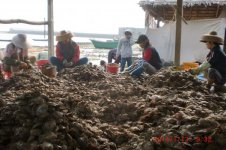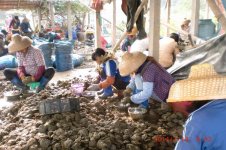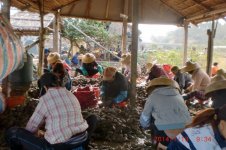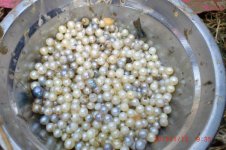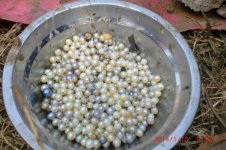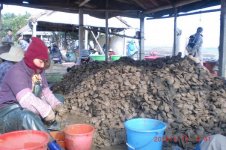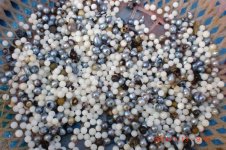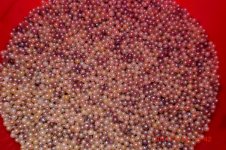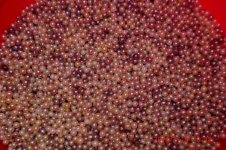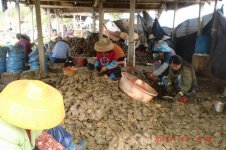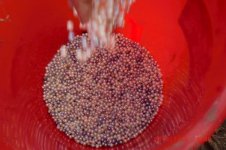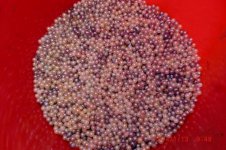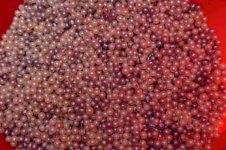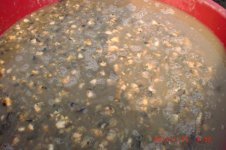You are using an out of date browser. It may not display this or other websites correctly.
You should upgrade or use an alternative browser.
You should upgrade or use an alternative browser.
Harvest Akoya Pearls Again
- Thread starter Bigwellpearls
- Start date
Lagoon Island Pearls
Well-known member
- Joined
- Dec 8, 2009
- Messages
- 2,155
Congratulations on a successful harvest!
Amrita
Member
Congratulations and thanks for the photos! Looks like a bumper harvest! 
GemGeek
Pearlista
Looks terrific. Thanks for the great photos. 
Lagoon Island Pearls
Well-known member
- Joined
- Dec 8, 2009
- Messages
- 2,155
I'm really glad Mr. He has posted a picture of the rejected nuclei and malformations. Sometimes these beads are cleaned and recycled or destroyed.
Very often, the misshapen pearls are destroyed too, but sometimes they find their way into the market as baroques and become confused as natural.

Very often, the misshapen pearls are destroyed too, but sometimes they find their way into the market as baroques and become confused as natural.
newberry
Well-known member
Thank you for sharing these pictures with us. It is a lot of work growing pearls. It makes me really appreciate the pearls I have.
Bigwellpearls
Well-known member
Expecting to solve the problem
Expecting to solve the problem
What factors cause the rejected nuclei and malformations? Scientists and experts conerned should study the problem and find a solution to them..Akoya pearl farmers here can only succeed in harvesting minority of superb Akoya pearls without know-how to avoid the rejected nuclei and malformations. Official funds are not raised to invest in studying this serious technological problem. The authorities concerned do not attach great importance to it even if the truth is reported to them by journalists.
We farmers lack excellent technitians...
Expecting to solve the problem
What factors cause the rejected nuclei and malformations? Scientists and experts conerned should study the problem and find a solution to them..Akoya pearl farmers here can only succeed in harvesting minority of superb Akoya pearls without know-how to avoid the rejected nuclei and malformations. Official funds are not raised to invest in studying this serious technological problem. The authorities concerned do not attach great importance to it even if the truth is reported to them by journalists.
We farmers lack excellent technitians...
What factors cause the rejected nuclei and malformations? Scientists and experts conerned should study the problem and find a solution to them..Akoya pearl farmers here can only succeed in harvesting minority of superb Akoya pearls without know-how to avoid the rejected nuclei and malformations. Official funds are not raised to invest in studying this serious technological problem. The authorities concerned do not attach great importance to it even if the truth is reported to them by journalists.
We farmers lack excellent technitians...
Thank you for your observations about this issue and bringing it to our attention. I hope others will comment. Perhaps the best technicians don't want to share their knowledge (secrets)?
Thank you for the most interesting report on your harvest. Best wishes for continued success!
Lagoon Island Pearls
Well-known member
- Joined
- Dec 8, 2009
- Messages
- 2,155
We farmers lack excellent technicians...
I appreciate your candor, Mr. He. It's my wish for your continued success.
Perhaps the best technicians don't want to share their knowledge (secrets)?
The greater part of pearl farming is common knowledge, however very few technicians are portable, even if they have the freedom to go wherever they please. Pearl farming is largely site specific. In my area, results vary widely from bay to bay. There is no possible way that even the finest technician from anywhere else could come to this area and immediately council me on the nuances of each. Likewise, I'd be a fish out of water on any other sites outside of my realm of experience.
Presently, a pearl technician is a birthright, selective or exclusive occupation. I'm as guilty as the next guy on this, but at the every least it's my focus to educate youth who are willing to learn and see, not flip them off as potential threats. In recent times, I'm seeing an increasing number of kids with wide-eyed enthusiasm on anything marine oriented. I'm often taken aback by the intelligent questions they'll pose and make no bones about responding with honest answers. It gives me to hope, to see other have hope, not just for pearl farming, but for the huge potential for biomedical research and environmental assessment.
While we see a multitude of groups representing sustainability, marketing, fashion etc., there are no organizations or peer review groups solely pertaining to technicians.
We cannot effectively rely on government, universities or research facilities to resolve the problem without some serious revisiting of how many producers operate. The issue lies squarely on farmers themselves. There can never be any educational programs unless farmers become a lot more forthright about discussing ways of improving common knowledge issues and arriving at a consensus for an educational curriculum. Nobody suggests anyone should give up proprietary information, but the overall levels of protectionism have not served the industry well. We only need to look at the Japanese model to understand. Once a mighty force in pearling technology, Japan rebuilt itself after near decimation from WW2 only to follow a different path of self destruction. Initially, laws had prohibited anyone from speaking to foreigners about pearling technology. Those laws have been long since repealed as unenforceable and needless. Japan enjoyed many years of profitability but drove it's own industry into the ground by over-production and poor environmentalism. I began pearl farming research while Mikimoto and Latendress were effectively colluding a monopolistic stranglehold on nuclei production and it went on for many years during my work. I have the highest respect and admiration for Japanese farmers as individuals, but garner little sympathy for the "tragedy of the commons" enabled by their government and short sighted corporations.
On the other hand, I appreciate many farmers spend considerable effort and expense improving their viability. It stands to reason they'd guard their technology. That said, in a competitive world these things ought to be treated as a sprint, not a long haul.
Once the cat is out of the bag, it's better to care for it cooperatively than to deny it exists or stuff it back in for the sake of other bagged cats. Many technicians are obligated contractually to work for one farmer, but not another. Equally, many technicians don't allow the farmer to attend their own grafting shed during the operation. Again, not giving an inch makes moving forward impossible. In fact, most technicians will never be invited to attend most farms because they fear they'll steal technology, when in reality they're probably missing out on learning something new.
Old habits die hard.
Bigwellpearls
Well-known member
Expecting to solve the problem
Expecting to solve the problem
Mr Dave,
Thank you very much for your frank remarks.
I also appreciate your efforts on pearling industry. Our quality of Akoya pearls will be improved if related technitians are generous to devote themselves to global pearl culture technology. Can we buy their know-how or expertise if they are willing sell them? Practically, most patent and invention from developed nations have been sold to China, such as, auto engine, computer hardware and software, sophisticated machinery and devices etc. Why expertise on saltwater oyster for cultivating pearls cannot be sold to China?
Expecting to solve the problem
Mr Dave,
Thank you very much for your frank remarks.
I also appreciate your efforts on pearling industry. Our quality of Akoya pearls will be improved if related technitians are generous to devote themselves to global pearl culture technology. Can we buy their know-how or expertise if they are willing sell them? Practically, most patent and invention from developed nations have been sold to China, such as, auto engine, computer hardware and software, sophisticated machinery and devices etc. Why expertise on saltwater oyster for cultivating pearls cannot be sold to China?
Lagoon Island Pearls
Well-known member
- Joined
- Dec 8, 2009
- Messages
- 2,155
Can we buy their know-how or expertise if they are willing sell them?
Variations of the Mise-Nishikawa method patent is the industry standard for tissue and bead grafting. To my knowledge, the only requirement would be licensing with Japan, if farmers were to produce pearls under the Mikimoto brand name.
Most technicians these days are Japanese nationals. Many pearls grown in south east Asia and the Pacific Islands are distributed through Japan, hence there are likely minimum standard requirements and royalties paid on behalf of the technicians.
Perhaps other farmers or distributors might chime in for a better understanding how these agreements are arranged.
Even though there are technically no legal barriers, embargos do exist between countries.
Many years ago, I attempted to inquire as to Japanese technicians and nuclei but met with stonewall tactics and underhandedness. My early mentor, a former Japanese national and his family, were admonished with threats of social and economic sanctions if he continued to represent me. I'm sure much has changed since 1982, but I've never looked back to Japanese technology or equipment since. If anything, it only strengthened my resolve to find my own way.
As the number of farms decline globally, so does the number of technicians.
Although this is a touchy and frustrating topic, it's refreshing to discuss or resolve common issues between farmers.
Again Mr. He, thank you for your honesty and kind comments.
Similar threads
- Replies
- 4
- Views
- 1K
- Replies
- 24
- Views
- 3K

